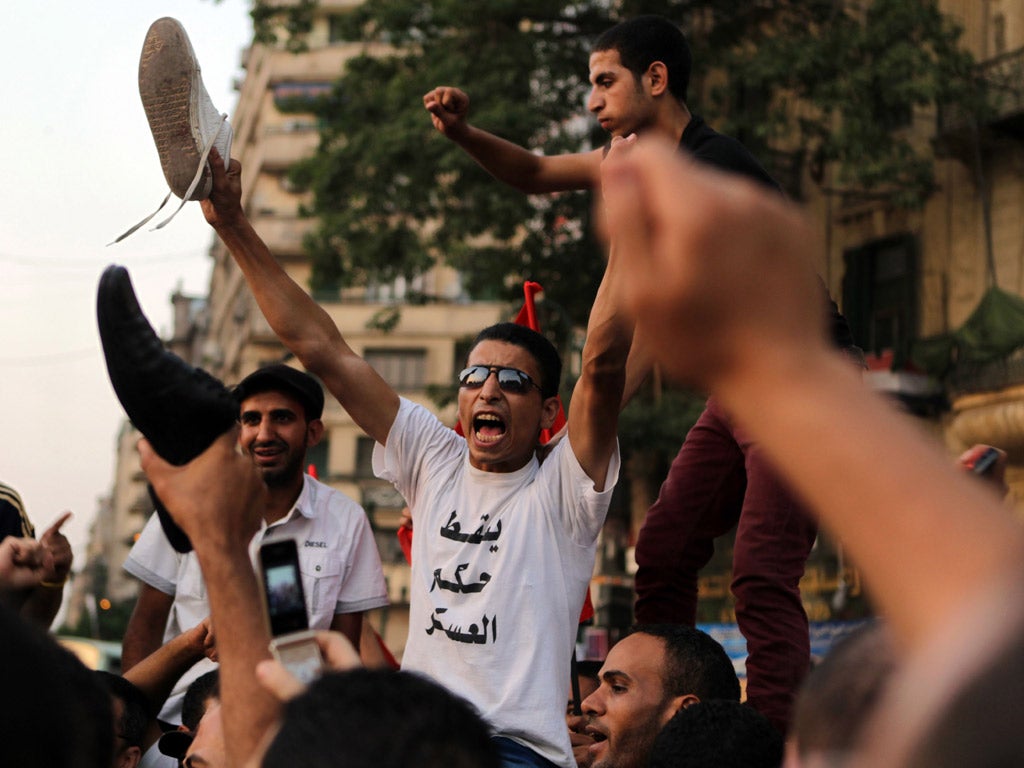Egypt's fragile democracy in crisis as court dissolves parliament

Your support helps us to tell the story
From reproductive rights to climate change to Big Tech, The Independent is on the ground when the story is developing. Whether it's investigating the financials of Elon Musk's pro-Trump PAC or producing our latest documentary, 'The A Word', which shines a light on the American women fighting for reproductive rights, we know how important it is to parse out the facts from the messaging.
At such a critical moment in US history, we need reporters on the ground. Your donation allows us to keep sending journalists to speak to both sides of the story.
The Independent is trusted by Americans across the entire political spectrum. And unlike many other quality news outlets, we choose not to lock Americans out of our reporting and analysis with paywalls. We believe quality journalism should be available to everyone, paid for by those who can afford it.
Your support makes all the difference.Egypt's generals were poised to seize complete political control over the country last night after a court ruled that the parliament elected only six months ago was illegal and must be dissolved.
The decision – which has left Egypt's political transition in chaos – means that an entirely new round of elections will have to be held, and threatens to unleash another wave of political upheaval just days before the presidential run-off vote, which begins on Saturday.
Legal analysts said the ruling military council, which had promised to hand over power in June, would now assume the role of the parliament. Explaining its announcement, the Supreme Constitutional Court said that a third of Egypt's legislature had been elected unlawfully in the ballot which began last December.
"The make-up of the entire chamber is illegal and, consequently, it does not stand," stated the ruling, according to the state news agency. In a separate ruling, the same court also declared that Ahmed Shafik, the former air force chief who once counted Hosni Mubarak as one of his friends, should not be disqualified from Sunday's presidential vote – a blow to activists, who fear that Mr Shafik will spearhead a "counter-revolution" to reverse the gains of last year's uprising.
The decision overturned a law passed by parliament in April banning former regime officials from the presidency. It leaves Mr Shafik free to run against the Muslim Brotherhood's Mohamed Morsi in Saturday and Sunday's poll.
Yesterday's rulings left many anti-government activists dumbfounded. There were clashes outside the court following the decision, where scores of police and troops backed by armoured cars stood guard in front of several hundred protesters.
"Egypt just witnessed the smoothest military coup," tweeted Hossam Bahgat, director of the Egyptian Initiative for Personal Rights. "We'd be outraged if we weren't so exhausted."
Mavie Maher, an official working for the defeated leftist presidential candidate Hamdeen Sabahi, told The Independent she felt Egypt had gone "back 10 years". She accused the military council of using Egypt's legal process to score a political victory against the Muslim Brotherhood.
Analysts have suggested that the Brotherhood – which controls nearly half the seats in parliament – has been haemorrhaging political support due to the lacklustre performance of its MPs.
Its overall share of the vote in the recent presidential elections, when Mr Morsi polled just under 25 per cent, was far lower than during the parliamentary elections – an indication, say some, of a significant decline in its popularity.
"The military council is playing with the law for its political interest," said Ms Maher. "In the next election the Muslim Brotherhood won't get the same percentage of seats."
Koert Debeuf, a representative for the European Parliament's liberal bloc in Cairo, said that yesterday's ruling was "a way of killing the Muslim Brotherhood". "Ever since the time of Nasser, what the old regime has hated most is the Muslim Brotherhood," he said.
Join our commenting forum
Join thought-provoking conversations, follow other Independent readers and see their replies
Comments